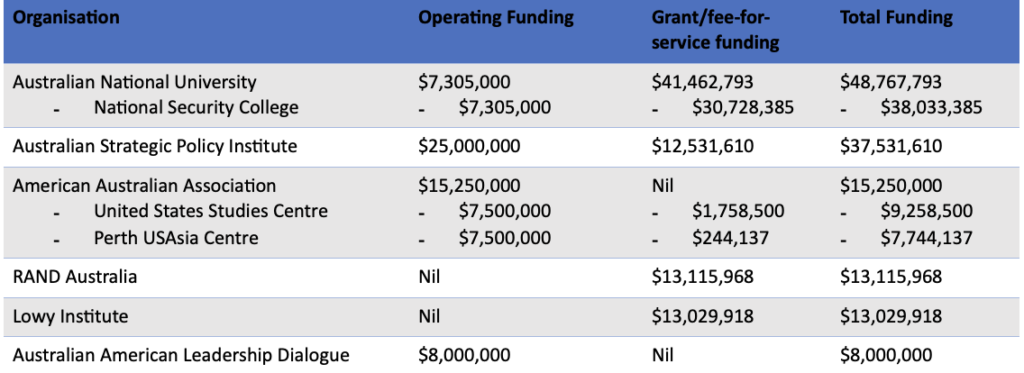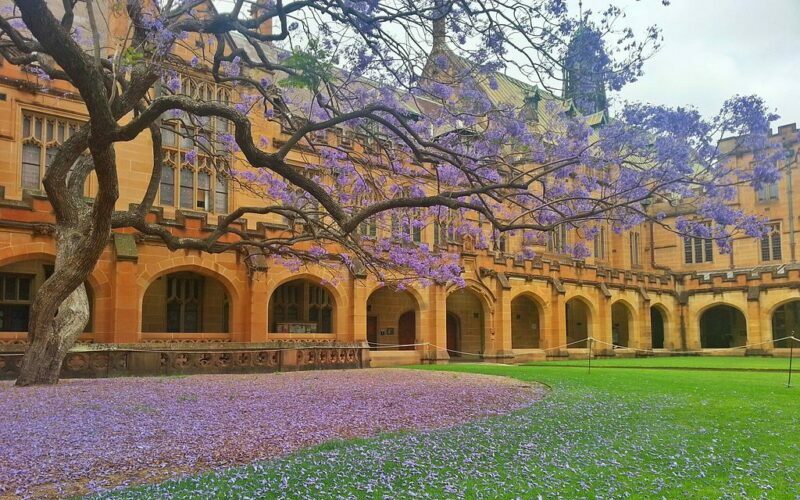America preying on our universities
January 15, 2025
The US is exploiting a privileged position in our society with formalised access to powerful means for shaping Australians’ attitudes to security. It purports to be ally and friend, but where’s the respect?
We should talk about a malignant influence on Australia’s security which has long been harboured unquestioned – so-called independent think tanks. Unquestioned until this Christmas, when the government released and responded to a perceptive report “Independent Review of Commonwealth Funding for Strategic Policy Work“ led by Peter Varghese, a former head of Foreign Affairs. Underlying his findings is concern about mushy processes in sending some $40m of government money to think tanks. Varghese’s findings are politely suggestive of rort. Apologists have rallied to support think tanks, with energy and little else – particularly for the “Australian Strategic Policy Institute” (ASPI). My P&I colleague Paddy Gourley has countered the criticism, kindly.
But the report does not evaluate the product of think tanks. So let’s scratch that surface. In the table below Varghese shows Australian organisations that received above $5 million in funding from 1 January 2019 – 31 December 2023. They accounted for a total of $138 million over five years.

Entities associated with the United States are prominent. What’s that all about? Take the United State Study Centre (USSC), receiving $9.2 m. Created by the Howard government with an endowment grant of $25m, USSC appeared innocuous enough at the outset. It claims to be an “independent, university- based research centre….offering rigorous analysis of American foreign policy, economic security”. It operates as an integral part of Sydney university, with growing student subscription. Thereby it enjoys academic status from Australia’s oldest tertiary institution. In reality USSC does not study American foreign policy and geopolitics in the factual, sceptical and dispassionate tradition of academia. Yet it awards degrees, publishes in journals, and operates in our society as if it does. Student fees are its largest source of income.
Looking more closely we find that USSC is a joint venture of the American Australian Association (headquartered in New York) with the University of Sydney. It is headed by Professor/ Dr Michael Green, who has been an active strategic policy insider in Washington and more widely on geopolitics. He served on the staff of the National Security Council at the White House from 2001 through 2005, coinciding with the neocon lie leading to the US invasion of Iraq. Green must well know the ruthless fabric of US geopolitics. He recently made a submission to the newly elected Trump team asserting : “ if China had its way, it would force Japan out of the East China Sea, overwhelm the Philippines and other countries in the South China Sea, coerce Taiwan into accepting Beijing’s authority and severing any meaningful connections to the United States and Japan, and establish a military base structure throughout the region that would corner India and Australia and control the sea-lanes that account for half or more of U.S. allies’ imports. China is pursuing the most revisionist strategy of any state since the end of the Cold War and the most dangerous since 1945, and the U.S. alliance system is the only thing keeping it in check. As China’s rising military power chips away at U.S. dominance, the United States has a dwindling margin for error.”
Which differs essentially from what China says about its strategic aspirations, and its history supports. Green ignores the views of eminent, knowledgeable Australians warning of US duplicity over China, including former leaders Paul Keating, Gareth Evans and Bob Carr. Clearly USSC assertions on China are partisan. Is it not apt to treat USSC as a US government propaganda tool, within Sydney University? Directly affecting our brightest tertiary students. And the damage doesn’t end with students getting a raw deal. The imprimatur of academia imparts a deceptive authenticity to propaganda, which penetrates our whole community, through mass media.
To illustrate. It is now common for our media to proclaim that Australia is on an urgent path to war with China. The Australian Financial Review (AFR) recently told its influential readership of “the urgency gripping war planners as the Albanese government spends billions of dollars on weapons, amid what has been described as the biggest military build-up since the end of World War II. A regional arms race is being fuelled by fears over China. The communist regime seeks to push its territorial claims in the South China Sea and East China Sea, manages an uneasy border truce with fellow nuclear-power India, props up Russia, and continues to harass Taiwan which Beijing has threatened to ‘reunify’ by force” (Andrew Tillett, 3 January). The AFR take is that China is the instigator of hostility- “China is challenging the US dominance in technology and weakening the liberal, democratic international-rules based order that America constructed in the second half of the 20th century and that helped it win the Cold War”. Which ignores the US trashing its “rules-based order”, United Nations and international judiciary. And that China’s defence spending is related to US hostility and military expansion aimed explicitly at China.
To convince readers of its war cry the AFR cites USSC Professor Peter Dean. As with a string of newish “professors” across our institutions correlated with funding inflow, it’s not clear that academic excellence is on display. Dean lists US foreign and defence policy as top of his expertise. He had no pedigree in the practice of Australian defence policy, until given a role in Minister Marles’ Defence Review of 2023. His status appears to be based on an essay reminiscent of military staff college debate, which finds the nuances in Australia’s security policy beyond it (“Australia’s American Alliance”, Melbourne University Press 2016).
So the US government fares well in projecting its security policy through USSC, largely for free. Our students are the main funder (39%), bless them. Howard’s grant adds 13 % (from investments), and a further 8% comes from Australian taxpayers. The second-largest contributor (30%) is ”members” (undefined), seemingly including governments of the United States, Japan and other close allies and partners of Australia, Australia Korea Foundation, Australia Japan Foundation, Asia Natural Gas and Energy Association, Financial Times, Japanese Government, Japan Foundation, KPMG, Lockheed Martin, Minerals Council of Australia, Microsoft, National Endowment for Democracy, Raytheon, Smith Richardson Foundation, Thales and Viasat.
One wonders whether the academic credibility of its graduates is a priority for the University of Sydney. Similar conflicts exist with the University of Western Australia and the Australian National University, differing in inflection and degree.
Varghese’s work has been valuable, not least for opening a window into a think-tank world rife with contradiction, extending to the credibility of our universities and how Australia’s interest has been subjugated pervasively to partisan, political behaviour. The US is exploiting a privileged position in our society with formalised access to powerful means for shaping Australian attitudes to security. It purports to be ally and friend, but where’s the respect?


